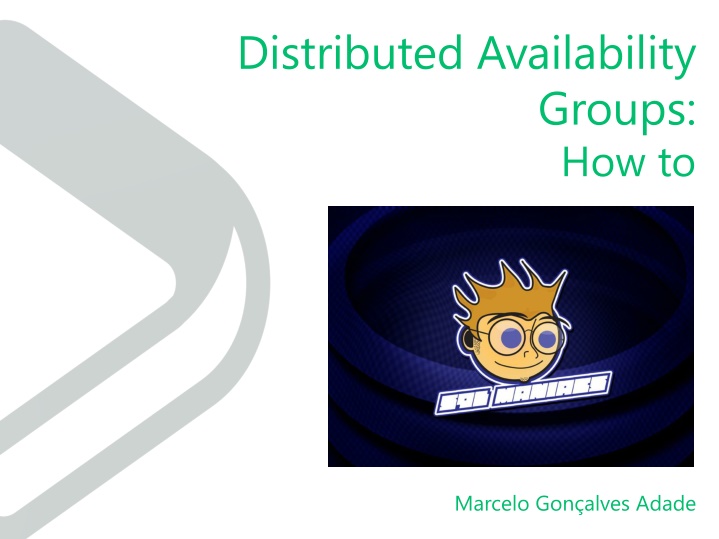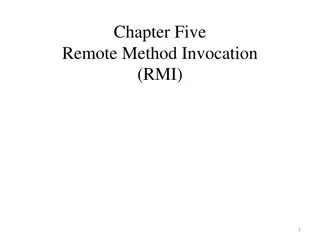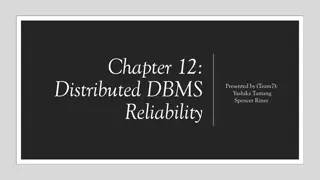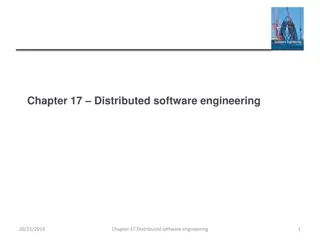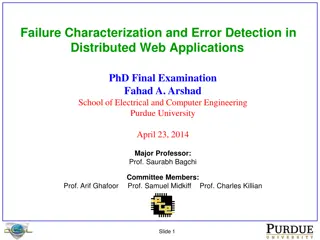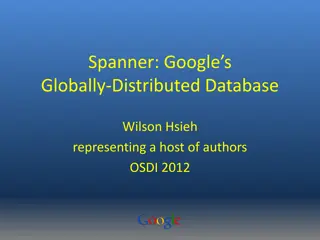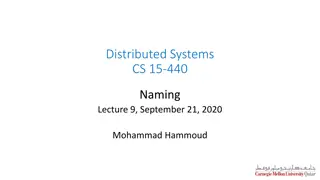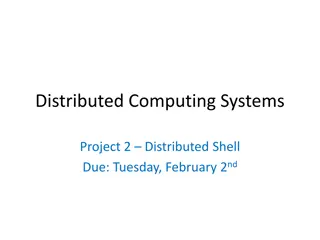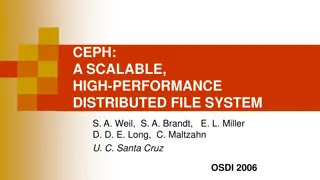Overview of Distributed Availability Groups by Marcelo Gonçalves Adade
Marcelo Gonçalves Adade, a Lead Database Consultant at The Pythian Group, provides insights on Distributed Availability Groups (DAGs) focusing on deployment, monitoring, scenarios, advantages, and key factors. He emphasizes the importance of proper configuration, management within SQL Server, and monitoring via DMVs for successful implementation of DAGs in SQL environments.
Download Presentation

Please find below an Image/Link to download the presentation.
The content on the website is provided AS IS for your information and personal use only. It may not be sold, licensed, or shared on other websites without obtaining consent from the author.If you encounter any issues during the download, it is possible that the publisher has removed the file from their server.
You are allowed to download the files provided on this website for personal or commercial use, subject to the condition that they are used lawfully. All files are the property of their respective owners.
The content on the website is provided AS IS for your information and personal use only. It may not be sold, licensed, or shared on other websites without obtaining consent from the author.
E N D
Presentation Transcript
Distributed Availability Groups: How to Marcelo Gon alves Adade
Sp_helpDBA(main) Marcelo is a Lead Database Consultant at The Pythian Group. He has about 15 years of experience as a DBA. He is currently a Microsoft MVP and holds the MCSE, MCT and MCSA Microsoft Certifications and also the Oracle OCP. Sp_helpDBA(sparetime) PASS User Group SQLMANIACS co-leader (http://www.sqlmaniacs.com.br) Blogger at DBBITS (www.dbbits.com.br) (Very Occasional) Gamer at PSN (geekmarcelo) Marcelo Gon alves Adade Microsoft Data Platform Consultant The Pythian Group /marcelo.adade @marceloadade Marcelo.adade GROUP LEADER
Agenda Ags recap Scenarios for DAGs An extension to Ags Deploying Monitoring
Demo Add the small AdventureWorks 6
Why use Distributed AGs? Disaster recovery in multi-site Migration scenarios Scale out readable secondaries Isn t Log Shipping cheaper?
Deploying 1. 2. 3. 4. 5. 6. 7. 8. 9. 10. Join the database(s) in the Secondary AG. Install Clusters and SQL SERVER; Create the proper endpoints; Make sure all the Servers can access the endpoints; Create the Primary AG; Create a listener for the Primary AG; Create the Second AG; Create a listener for the Secondary AG; Create the Distributed AG on the Primary; Join the Distributed AG on the Secondary;
Important factors Management is done within SQL SERVER (no GUI) No automatic failover Check Endpoint privileges Patching considerations
Demo 11
Monitoring Done via DMVs No GUI available
References https://docs.microsoft.com/en-us/sql/database-engine/availability- groups/windows/distributed-availability-groups?view=sql-server-2017 https://docs.microsoft.com/en-us/sql/database-engine/availability- groups/windows/configure-distributed-availability-groups?view=sql-server-2017 https://www.mssqltips.com/sqlservertip/5053/setup-and-implement-sql-server-2016- always-on-distributed-availability-groups/
Thank you and keep in touch! Microsoft Data Platform Consultant - Pythian www.pythian.com PASS User Group SQLMANIACS co-leader (http://www.sqlmaniacs.com.br) Blogger at DBBITS (www.dbbits.com.br) @marceloadade /marcelo.adade Marcelo.adade 14
